

Tobacco-Free Campuses on the Rise: Q&A with Dr. Howard Koh, HHS. NPH: What is it that’s so appealing about tobacco for young adults, high school students and college students, that despite all the warnings and all the education?
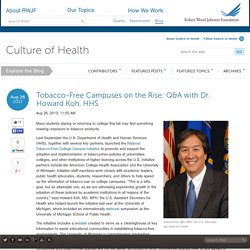
Dr. Koh: The tobacco industry knows that appealing to young people is a way to attract new and lifelong customers, and that is why we need to change the social norms when it comes to smoking. For decades, tobacco use has tragically led to dependence, disability and death. It’s time to reclaim the tobacco-free social norm that promotes wellness and health and that’s what this initiative is all about. NPH: What impact do tobacco-free policies have on students ever starting to use tobacco? Dr. NPH: Have you found that the tobacco initiative has also increased and broadened the general conversation about health and prevention on some campuses?
Dr. NPH: What arguments have been persuasive to help campuses take that next step toward tobacco-free campuses? Dr. Dr. Dr. Dr. Dr. Dr. Campus smoking rate on the decline. A survey conducted to gauge the success of the University’s smoking ban two years after its implementation shows promising results for those favoring a smoke-free campus.
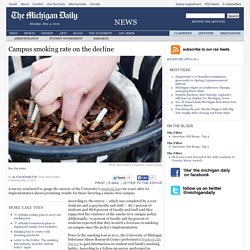
According to the survey — which was completed by 2,022 students and 2,405 faculty and staff — 82.7 percent of students and 88.8 percent of faculty and staff said they supported the existence of the smoke-free campus policy. Additionally, 72 percent of faculty and 65 percent of students reported that they noticed a decrease in smoking on campus since the policy's implementation. Prior to the smoking ban in 2011, the University of Michigan Substance Abuse Research Center performed a Student Life Survey to gain information on student and faculty smoking habits. According to a follow-up survey performed in November, the percentage of faculty and staff who self-reported smoking decreased from 6 percent in the 2011 survey to 4 percent. National Tobacco-Free College Campus Initiative. Tobacco-Free vs.
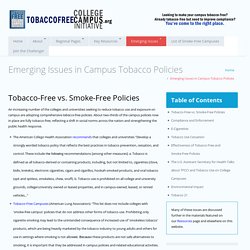
Smoke-Free Policies An increasing number of the colleges and universities seeking to reduce tobacco use and exposure on campus are adopting comprehensive tobacco-free policies. About two-thirds of the campus policies now in place are fully tobacco-free, reflecting a shift in social norms across the nation and strengthening the public health response. The American College Health Association recommends that colleges and universities "Develop a strongly worded tobacco policy that reflects the best practices in tobacco prevention, cessation, and control.
These include the following recommendations [among other measures]: a. Back to top Compliance and Enforcement Effective Strategies for Ensuring Cooperation and Compliance with a Tobacco-Free Campus Policy (TFCCI and National Center for Tobacco Policy) Tob_Control-2013-Lee-22-107-libre.pdf. CUNY to Ban Smoking at All Its Colleges. Photo Last summer, the University at Buffalo banned on its three campuses.
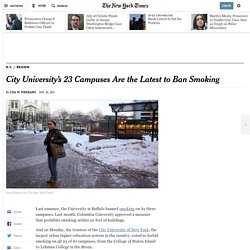
Last month, Columbia University approved a measure that prohibits smoking within 20 feet of buildings. And on Monday, the trustees of the , the largest urban higher-education system in the country, voted to forbid smoking on all 23 of its campuses, from the College of Staten Island to Lehman College in the Bronx. CUNY’s move is the latest in a wave of comprehensive smoking bans on college campuses nationwide, a trend that began about five years ago and has gathered momentum in recent months. The American Nonsmokers’ Rights Foundation, a nonprofit advocacy group, reported this month that at least 466 campuses had completely banned smoking or passed resolutions to do so. Unhealthy habits, from keg parties to all-nighters, have long been associated with the college experience.
“It makes a lot of sense,” said Cynthia Hallett, executive director of the nonsmokers’ foundation, which is based in Berkeley, Calif. Newsweek. PUBLIC HEALTH: Number of smoke-free college campuses triples as U.S. accelerates anti-tobacco push. It's no longer a "Mad Men" world.
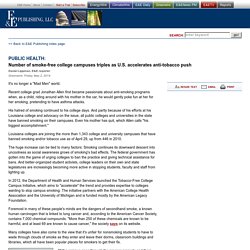
Recent college grad Jonathan Allen first became passionate about anti-smoking programs when, as a child, riding around with his mother in the car, he would gently poke fun at her for her smoking, pretending to have asthma attacks. His hatred of smoking continued to his college days. And partly because of his efforts at his Louisiana college and advocacy on the issue, all public colleges and universities in the state have banned smoking on their campuses. Even his mother has quit, which Allen calls "his biggest accomplishment. " Louisiana colleges are joining the more than 1,343 college and university campuses that have banned smoking and/or tobacco use as of April 29, up from 446 in 2010.
The huge increase can be tied to many factors: Smoking continues its downward descent into uncoolness as social awareness grows of smoking's bad effects. He and fellow students would see cigarette litter on the campus and ask: "Where are these cigarette butts coming from? Should colleges be allowed to implement smoking bans on their campuses?